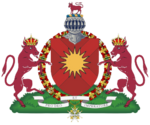Foreign Agents Act (Makko Oko)
| Foreign Agents Act | |
|---|---|
 | |
| Citation | 2023 c. XX |
| Enacted by | 2nd Session of the Law Council |
| Date enacted | March 31st, 2023 |
| Date effective | April 9th, 2023 |
| Status: Current legislation | |
The Foreign Agents Act (c. XX) is an Act of Council of the 2nd Session which was ratified on March 31st, 2023 by Emperor Conall Solis and came into force on April 9th the same year. The act was written to help restrict foreign influence, according to the legislative text, and while a short piece of legislation, was powerful in successfully restricting citizens with foreign influence from doing things such as working for the government, obtaining welfare, etc. The law is similar to ones ratified by other nations years prior however, Makko Oko's is notably the strongest and strictest of them. It was opposed even during drafting by the public, with the largest voice being those representing immigrants and foreigners because under the law, they can't be granted citizenship without both immigration court and ministerial approval if they are targeted and cited as a foreign agent.
Legislative History
Cases
Sections
Section I - Defining Foreign Agents
Section II - Agent Registration
Section III - Requirements & Restrictions
Enforcement
Since the law's enactment, it received much pushback at first, but since then has fallen out of the public eye. This is because the law, even though on the books, is not exercised frequently, however, some report that the law has been abused through articles XI and XII to force people who are not foreign agents, such as suspected criminals, to register as agents and thus be monitored more closely in a legal manner without the need for warrants, and to also restrict the activities that they are permitted to do. The government has denied the allegations and no proof of abuse has ever surfaced.
Effects
Full Text
SECTION I - DEFINING FOREIGN AGENTS
ARTICLE I - A foreign agent shall heretofore be defined as any individual on state soil that receives donations from international sources or that is representing an international business.
ARTICLE II - It shall not be defined a foreign agent if the international business has a domestic business or activity, unless the business resides in a hostile territory.
ARTICLE III - A domestic business under Article II does not count shall the business only be related by stocks or parents.
ARTICLE IV - Anything politically or religiously oriented, from an international source, that a business or individual is involved in shall be defined as a foreign agent.
ARTICLE V - All NGO's and political campaigns shall be defined as foreign agents.
ARTICLE VI - Any business that shall be eligible for the designation shall register as a business under this law.
ARTICLE VII - Any former cabinet minister of the state that receives support or is influenced by a foreign government shall be defined as a foreign agent.
ARTICLE VIII - All petitioners and lobbyists representing foreign governments or being supported by one, shall be defined as foreign agents.
SECTION II - AGENT REGISTRATION
ARTICLE IX - Any entity who shall such qualify for the designation of foreign agent shall such register that designation with the ISOC.
ARTICLE X - The ISOC shall under this article be granted full authority to manage the FARP (Foreign Agent Registration Program) and to enforce compliance with this law.
ARTICLE X - All foreign agents shall re-register and update their registration annually with the ISOC.
ARTICLE XI - The Minister Of Diplomatic Affairs or the courts may require an entity to register as a foreign agent as justified for national security.
ARTICLE XII - The state may, as seen fit, force any entity that supports or receives influence of, a foreign government, to register as a foreign agent.
ARTICLE XIII - During periods of war or martial law, anybody who distributes foreign material against the state must register as a foreign agent.
SECTION III - REQUIREMENTS & RESTRICTIONS
ARTICLE XIV - Foreign agents shall not be authorized to be employed in the civil service or to enter the military until such time that the designation is no longer true.
ARTICLE XV - Foreign agents shall be required to report all income and expenses, including that of which is foreign or not taxable, to the TCEEA.
ARTICLE XVI - As applicable to an entity, written notice must be provided to all serviced or hired that they're a foreign agent.
ARTICLE XVII - Foreign agents shall hereby be barred from taking advantage of any immigrant support program.
ARTICLE XVIII - Foreigners that are also foreign agents shall hereby be restricted from obtaining citizenship, by requiring the approval of the Immigration Court and the Ministry Of Internal Security prior to beginning the process.
ARTICLE XIX - Foreign agents shall be required to report all related transactions in regards to their designation.
ARTICLE XX - Foreign agents shall be published on a public government database for foreign agents for all to view.
ARTICLE XXI - As applicable to media entities, prior approval for all content must be obtained by the DIC before distribution is to be authorized.
ARTICLE XXII - The Emperor may establish more restrictions and requirements as seen fit.
